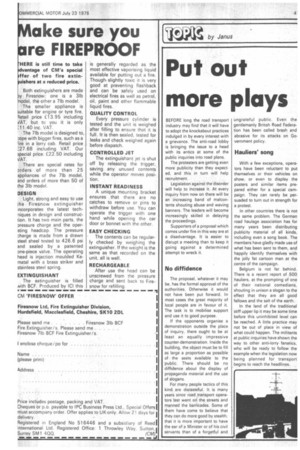Put out more plays
Page 77

If you've noticed an error in this article please click here to report it so we can fix it.
BEFORE long the road transport industry may find that it will have to adopt the knockabout practices indulged in by every interest with a grievance. The anti-road lobby is bringing the issue to a head with its .antics at some of the public inquiries into road plans.
The protesters are getting even more publicity than they expected, and this in turn will help recruitment_ Legislation against the disorder will help to increase it. At every inquiry from now on there will be an increasing band of malcontents shouting abuse and waving banners. The leaders will become increasingly skilled in delaying the proceedings.
Supporters of a proposal which comes under fire in this way are at a disadvantage. It is . easier to disrupt a meeting than to keep it going against a determined attempt to wreck it.
No diffidence
The proposal. whatever it may be, has the formal approval of the authorities. Otherwise it would not have been put forward. In most cases the great majority of local people are in favour of it The task is to mobilise support and use it to good purpose.
If the opponents organise a demonstration outside the place of inquiry, there ought to be at least an equally impressive counter-demonstration. Inside the building, the object must be to fill as large a proportion as possible of the seats available to the public. There should be no diffidence about the display of propaganda material and the use of slogans.
For many people tactics of this kind are distasteful. It is many years since road transport operators last went on the streets and manned the barricades. Some of them have come to believe that they can do more good by stealth: that it is more important to have the ear of a Minister or of his civil servants than of a forgetful and ungrateful public. Even the gentlemanly British Road Federation has been called brash and abrasive for its attacks on Government policy.
Hauliers' song
With a few exceptions, operators have been reluctant to put themselves or their vehicles on show, or even to display the posters and similar items prepared either for a special campaign. They can rarely be persuaded to turn out in strength for a protest.
In other countries there is not the same problem. The German road haulage association has for many years been distributing publicity material of all kinds, including even a song book. The members have gladly made use of what has been sent to them, and happily identify themselves with the jolly fat cartoon man at the .centre of the campaign.
Belgium is not far behind. There is a recent report of 500 hauliers, at the prompting of one of their national comedians, shouting in unison a slogan to the effect that they are all good fellows and the salt of the earth.
In the land of the traditional stiff upper lip it may be some time before this uninhibited level can be reached. A little practice may not be out of place in view of what could happen. The militants at public inquiries have shown the way to other anti-lorry fanatics, who will be ready to follow the example when the legislation now being planned for transport begins to reach the headlines.
















































































































